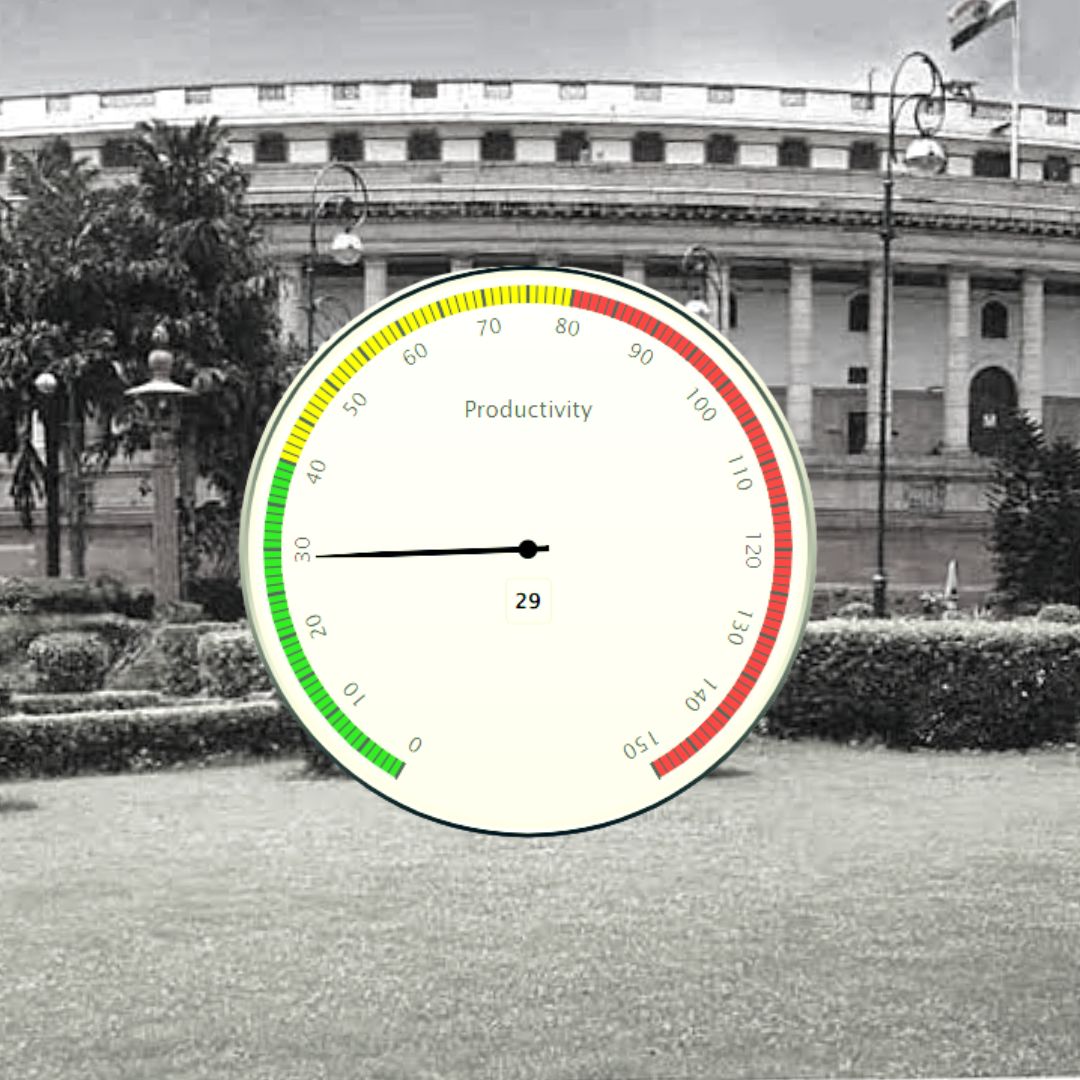
Image Credit: EastGaroHills, PRS
Over Rs 2.5 Lakh Invested Every Minute In Parliament, What Does The Productivity Report Tell Us?
Writer: Ronit Kumar Singh
A confident and reliable journalist who always desires to toss the unheard voices. I cover politics and governance extensively through stories.
India, 30 July 2022 5:30 AM GMT | Updated 30 July 2022 5:31 AM GMT
Editor : Shiva Chaudhary |
A post-graduate in Journalism and Mass Communication with relevant skills, specialising in content editing & writing. I believe in the precise dissemination of information based on facts to the public.
Creatives : Ronit Kumar Singh
A confident and reliable journalist who always desires to toss the unheard voices. I cover politics and governance extensively through stories.
The ongoing monsoon session of the Parliament is mostly seeing disruption amid protests and slogans raised by the opposition. Both the houses have failed in carrying out business so far, putting the productivity on a toss.
The Monsoon session of the Parliament, which commenced on Monday (July 18), is scheduled to end on Friday (August 12). So far, the Lok Sabha and Rajya Sabha have witnessed protests and slogans leading to business disruption in the House. The opposition seems to be unhappy with the governance model of the Bharatiya Janata Party (BJP) and its allies.
In three days, the speaker suspended nearly 23 Members of Parliament of both houses, including Sanjay Singh and Mahua Moitra, for the remaining week, the highest in the history of Parliament. The decision came when these MPs started protesting against the inflation and price hikes inside the House, allegedly in an unlawful manner. After the series of protests which led to disruption, the productivity meter of the parliament clocks at a record-low.
The Monsoon session began on Monday (July 18), with new members taking the oath. By afternoon, both the houses were adjourned to be continued on Tuesday (July 19) amid protest by the opposition over Agnipath Scheme and GST rate hikes. Similarly, almost every day, the House was disturbed, which made the productivity of the same go for a toss.
A video of Congress MP Adhir Ranjan Choudhary surfaced across social media platforms on Thursday (July 28), where he can be heard saying 'Rashtrapatni' to the president of India, Draupadi Murmu. It escalated controversy and heated debate in the Parliament, where BJP women leaders attacked the Congress MP over his remark on a tribal woman sitting on the top constitutional post of India.
The Parliament on Friday (July 29) started functioning amid rising slogans and massive protests by the MPs of the opposition. Following this, the Parliament has been adjourned for the remaining week, till Monday (August 1). Due to some or the other reason, every day the productivity mark of both the houses is declining at a faster rate.
Cost To Run Parliament
Each minute of running Parliament during sessions costs the exchequer Rs 2.5 Lakh every minute, which is a massive sum of money if added for the entire year. Rajya Sabha and Lok Sabha run for almost 80 days throughout the year, and each day consists of nearly six hours of business.
The minister of Parliamentary Affairs, Pawan Kumar Bansal, under the Congress government, informed, "In one year, Parliament runs for eighty days during sessions. Each day, business in both Houses is conducted for around six hours. Considering the total annual expenditure on Parliament, each minute of running the House costs ₹ 2.5 lakh."
Productivity On Toss
The monsoon session of 2021 and 2022 has been a failure so far in the history of the Indian Parliament. In the monsoon session of 2021, the productivity of Lok Sabha and Rajya Sabha remained less than 30 per cent. Similarly, in the first ten days of the ongoing monsoon session, the productivity of both the houses remained below the 25 per cent mark, according to PRS Legislative Research data.
The productivity of the current session is further expected to decline as both the houses have been adjourned on Friday (July 29) till August 1, 2022. A similar incident was seen in the Budget Session of 2018, where the productivity of the Rajya Sabha was 28 per cent and 23 per cent for the Lok Sabha.
The productivity of both the houses earlier 1978 used to cross the 100 per cent mark. Many parliamentarians believe that with the rise of regional parties and rural politics, the discussion in the Parliament has increased significantly, sometimes leading to protest. The primary reason for the declining productivity rate is believed to be disruption caused in the session due to the raising of slogans and protests.
Hard-Earned Money Of Citizens Is Going To Waste?
Whenever there is a report of Parliament failing in carrying out the business, the criticism by the country's taxpayers reaches its peak. The agitation and anger should be obvious because the Parliament functions on the hard-earned money of taxpayers who expect some business in exchange for the country's progress.
The disruption in the winter session of the Parliament in 2017-18 caused a loss of over 140 Cr to the exchequer. This created a severe question among the taxpayers on the functioning of the Parliament. But if there's criticism, there is also appreciation from the taxpayers.
In the budget session of 2019, the productivity of Lok Sabha touched 137 per cent and 103 per cent for Rajya Sabha. The Lok Sabha did business for a magnificent 480 hours, and, during the 37 sessions, no time was lost due to adjournments and interruptions. Following this, the taxpayers lauded and appreciated the efforts of both ruling and opposition parties.
Also Read: Bengaluru Youth Urges PM Modi To Pass Tobacco Products Amendment Bill In Ongoing Monsoon Session
 All section
All section














